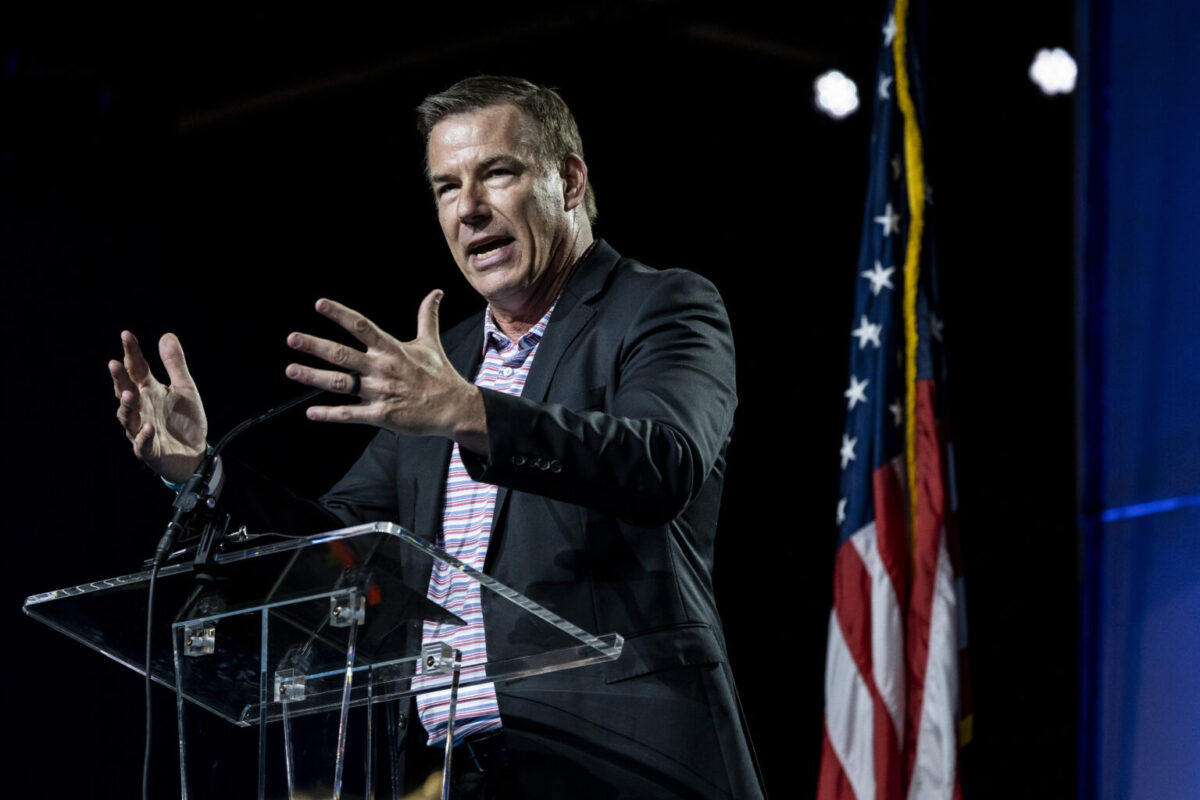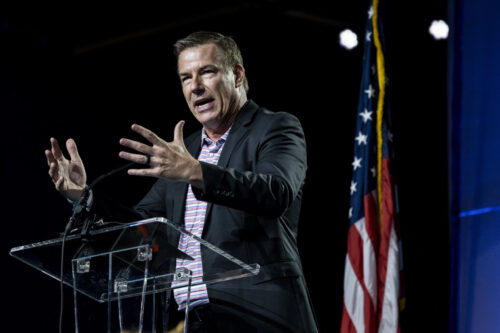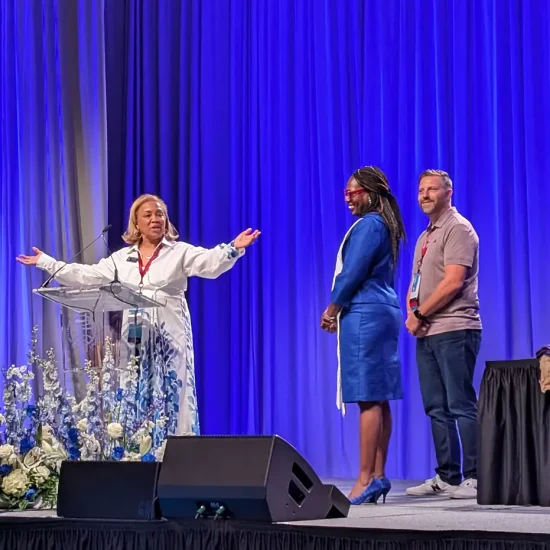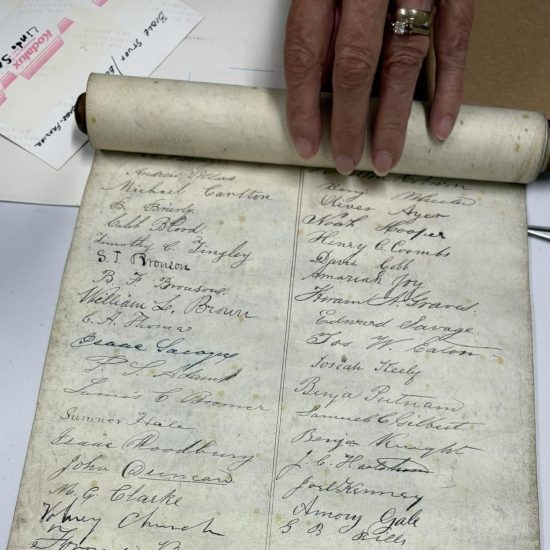
(RNS) — A North Carolina pastor who championed sex abuse reforms in the Southern Baptist Convention plans to run for president of the nation’s largest Protestant denomination.
Bruce Frank, longtime pastor of Biltmore Church in Asheville, announced Tuesday (April 2) that he would allow his name to be placed for nomination at the SBC’s annual meeting this summer in Indianapolis.

Bruce Frank discusses the Sexual Abuse Task Force’s work during the Southern Baptist Convention annual meeting in Anaheim, Calif., June 14, 2022. (RNS photo/Justin L. Stewart)
“As the largest missionary force in modern-day history, I believe the best days of the SBC can be ahead of us,” said Frank in announcing his candidacy, saying that as president he would focus on evangelism, abuse reform, and revitalizing churches.
Frank will enter a crowded race for the presidency — a volunteer role that oversees the denomination’s annual meeting and helps influence nominations for key SBC committees.
The SBC presidency is also a bully pulpit, with the president becoming the public face of the 13 million-member denomination during their term in office. Most SBC presidents — like current president and Texas pastor Bart Barber — have served two consecutive one-year terms.
Frank will join fellow North Carolina pastor Clint Pressley, Oklahoma pastor Mike Keahbone, Tennessee pastor Jared Moore and seminary professor David Allen as candidates.
Those other four candidates recently took part in an online forum, where much of the conversation revolved around the denomination’s finances, abuse reforms, and a proposed amendment that would bar churches where any woman holds the title of pastor from the SBC.
The next SBC president could play a role in the future of abuse reforms in the denomination. Currently, those reforms are being overseen by a volunteer implementation task force appointed by Barber — and that task force’s future would be likely determined by his successor.
While there has been some progress on the state and local levels, with more churches aware of the need to take abuse seriously, reforms on a national level have stalled. There is no long-term plan to fund reforms and little support so far for a new nonprofit known as the Abuse Response Commission — which organizers say was incorporated recently to help oversee reforms long term.
The implementation task force does plan to unveil at the SBC annual meeting a new curriculum for churches to help them respond to abuse and will host a meeting with state leaders later this month.
During the recent presidential forum, the candidates said abuse was a serious problem for the SBC, but Moore and Allen said abuse was not a crisis or systemic in the denomination. Keahbone, who serves on the abuse implementation task force, said it was a crisis.
Pressley said abuse was a crisis but that the response to the crisis has caused some “fog” and confusion.
“With that fog clearing up a little bit, we are seeing this is not a system-wide crisis,” he said, according to Baptist Press, an official SBC publication. “It is a crisis, but it’s not showing up in every church. However, every church needs to be prepared. Every church needs to react.”
During the forum, Moore was skeptical about a proposed “Ministry Check” database of SBC abusers, which was approved by messengers to the SBC’s annual meeting. A website for the database was launched last year but no names appear on the site.
Moore said the database was unworkable.
“As a local Southern Baptist pastor, it sounds like the SBC version of the FBI,” he said, according to Baptist Press. “To think that we can investigate potential abuse claims is so unrealistic and unachievable. I admire the zeal, but think they’re mistaken.”
In an interview earlier this year, Keahbone defended the ongoing work of the task force and the SBC’s progress on abuse reform while saying there is more work to do. He also said he was running for president out of a deep love for the denomination — saying a local church in Oklahoma had changed his life.
Keahbone said he had come from a troubled family that had little to do with the church. Then a volunteer from a local church invited him to vacation Bible school — and he said he found love and acceptance at the church.
“They just loved me,” he said. “What we’ve always been about as a convention has been the gospel. And when we’re centered on the gospel, it fixes everything else.”
Frank said that if elected president, he would continue to champion the abuse reforms passed by local church representatives, known as messengers. He said there have been loud voices on social media trying to downplay the scope of reforms.
“I think what we’ve seen a few times is that loudness on Twitter does not necessarily equal the messengers’ convictions,” he said. He also said he’d focus on revitalizing older churches, which he sees as tied to the SBC’s broader evangelistic mission. Like many denominations, the SBC has seen membership decline in recent years — falling from 16.3 million members in 2006 to just over 13 million today. Many of its churches — like churches everywhere in the U.S. — have also declined and face uncertain futures.
“Math shows that if they don’t change their trajectory, they are going to close,” he said — adding that he believes many churches can be turned around.
In recent years, the SBC’s presidential races have been contentious — with candidates backed by a group known as the Conservative Baptist Network, which claims the denomination has become too liberal, facing off against those who think the SBC has challenges but remains conservative.
That’s led to fierce debate on social media and pointed differences between candidates. So far, this year’s race has taken a friendlier tone.
Frank said it remains to be seen if that tone remains.
“It’s going to be an interesting few months,” he said.






